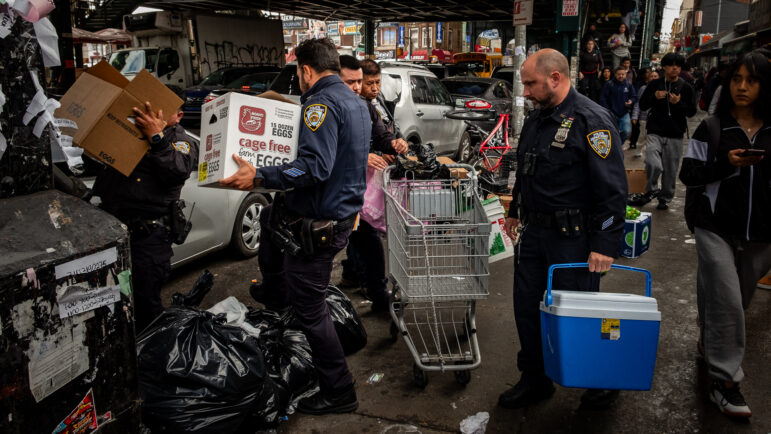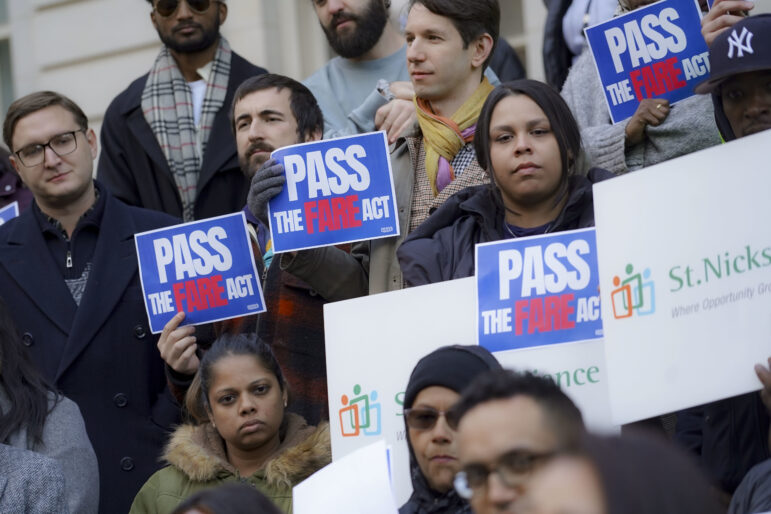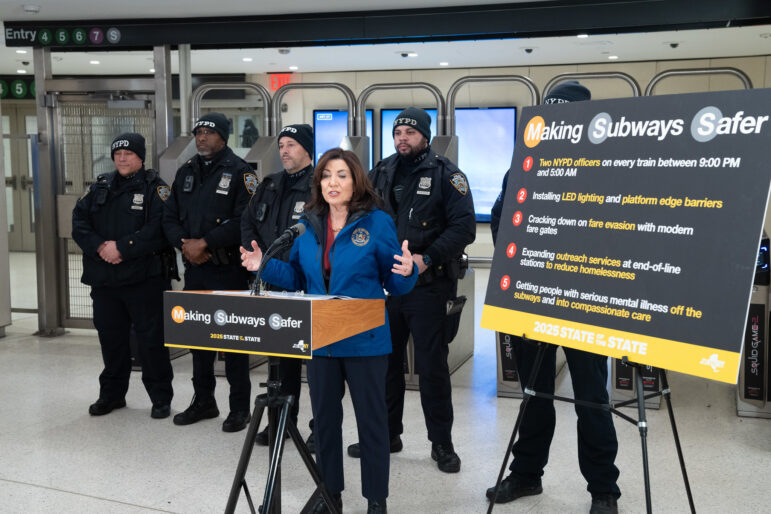You lose your balance as the A train stops short, brushing against the newspaper and bag of a fellow commuter as you regain your footing. Have you just stumbled, or have you committed a class A misdemeanor, Jostling? Were a police officer to apply the statute’s vague wording and arrest you, and a judge to agree with the officer’s interpretation, you could be facing up to one year in prison.
Jostling, along with Criminal Trespassing, Disorderly Conduct, Loitering for the Purpose of Engaging in a Prostitution Offense and several other New York State laws contain broad and equivocal wording. Punishments for the above violations and crimes can potentially including jail time and heavy fines. Timothy Sandefur, the principal attorney of The Pacific Legal Foundation, condemns the serious consequences resulting from many vague laws on the federal and state level. “Vagueness,” he wrote in a 2010 Forbes op-ed “turns the law into a sword dangling over citizens’ heads.”
The Police Reform Organization Project, or PROP, a new organization that hopes to change what is calls the “ineffective, unjust, illegal, bullying and starkly racially biased” practices of the NYPD, believes that New York’s vaguely worded statutes permit the misuse of police power.
Jostling embodies this concern. According to New York State penal law, one has committed Jostling when he or she “places their hand in the proximity of a person’s pocket or handbag.” PROP believes unclear language of this sort “enable[s] police officers to charge individuals with crimes when no clear violation of the law has occurred.”
Concerns regarding vague misdemeanor statutes are probably as old as the laws themselves. Jostling in particular has been repeatedly attacked as unconstitutional under the Void for Vagueness doctrine, which cites statutes as “not definitive enough to allow ordinary people to understand what conduct is clearly prohibited through its wording,” according to common case law.
Multiple states that have adopted a plethora of New York’s theft offense statutes specifically leave out Jostling, and the elasticity of the law has been debated in many U.S. state courts.
Subsections E and F of New York’s Criminal Trespass in the Third Degree law are cited as additional examples of indefinite language. “The law is less than fully clear,” explains Robert Newman, a staff attorney in the special litigation unit of the criminal defense division at the Legal Aid Society, speaking about public housing trespass violations. “Numerous people are being arrested [under subsections E and F] even though they are relatives of residents, or actual residents themselves.” The Legal Aid Society is one of a handful of organizations behind a pending federal lawsuit against the state’s trespass statutes. The plaintiffs’ hope is that reforms will be made to the law and the way police enforce it.
The Disorderly Conduct statute provides another instance of inconclusive phraseology. The violation’s subsections, which include “unreasonable noise” and “creating hazardous conditions,” have been cited many times in court, including in the 1959 case People of the State of New York v. Hugh Broadbent, as “insufficient in law to constitute a violation of the disorderly conduct section.” The broad phrasing of the law may also account, in part, for the 17,000 summonses for “unreasonable noise” that were given out last year. If a charge is vague, explains Robert Gangi, senior policy advocate at the Urban Justice Center, “it doesn’t take much to build a case that someone is guilty of that offense.”
Nor does it take much to see a racial pattern to the enforcement of the law. According to The Department of Criminal Justice Services, of the 64,884 arrests for Disorderly Conduct in 2010, people of color accounted for over 51,000.
Newman mentioned many residential complaints of overuse and abuse concerning the statute of Loitering for the Purpose of Engaging in a Prostitution Offense coming from Jackson Heights, Queens. He explained that many women, particularly those belonging to the Latina transgender community, say they have been targeted by police and sometimes arrested as alleged sex workers. “They will just be socializing, not soliciting any services,” Mr. Newman explained indignantly.
However, some argue that the substantial and powerful amounts of discretion given to law enforcement officers are necessary. “The law,” writes Mark Stevens, an Assistant Professor of Criminology at California State University, simply does not cover every situation that a police officer encounters in the field…. Police encounter a wide range of behaviors and a variety of situations that the law hasn’t even thought about yet.”
Beyond arguments praising or condemning statutes’ elastic language, it’s clear that minor charges, such as Disorderly Conduct or Jostling, can have serious consequences. Not only can a questionable charge be placed on a person’s record, but an individual who does not go to court on a potentially illegitimate summons can face an enhanced sentence next time they are stopped, frisked and arrested. Even if a judge dismisses an inadequate case (50 percent of all summonses in recent years have been dismissed in court), “a citizen is still handcuffed, locked in a cell, and feels a breach of trust from the people who should be protecting them,” explains a New York City public defender who asked not to be named.
What’s more, critics say, the enforcement of these laws erodes support for police in neighborhoods where gaining a community’s trust might be valuable.
“Based on where I grew up, I try not to look at cops,” explains Tony Peralta, an artist and graphic designer from Washington Heights who was once arrested for Jostling and later had the charges dropped. “They take advantage of their power.”








